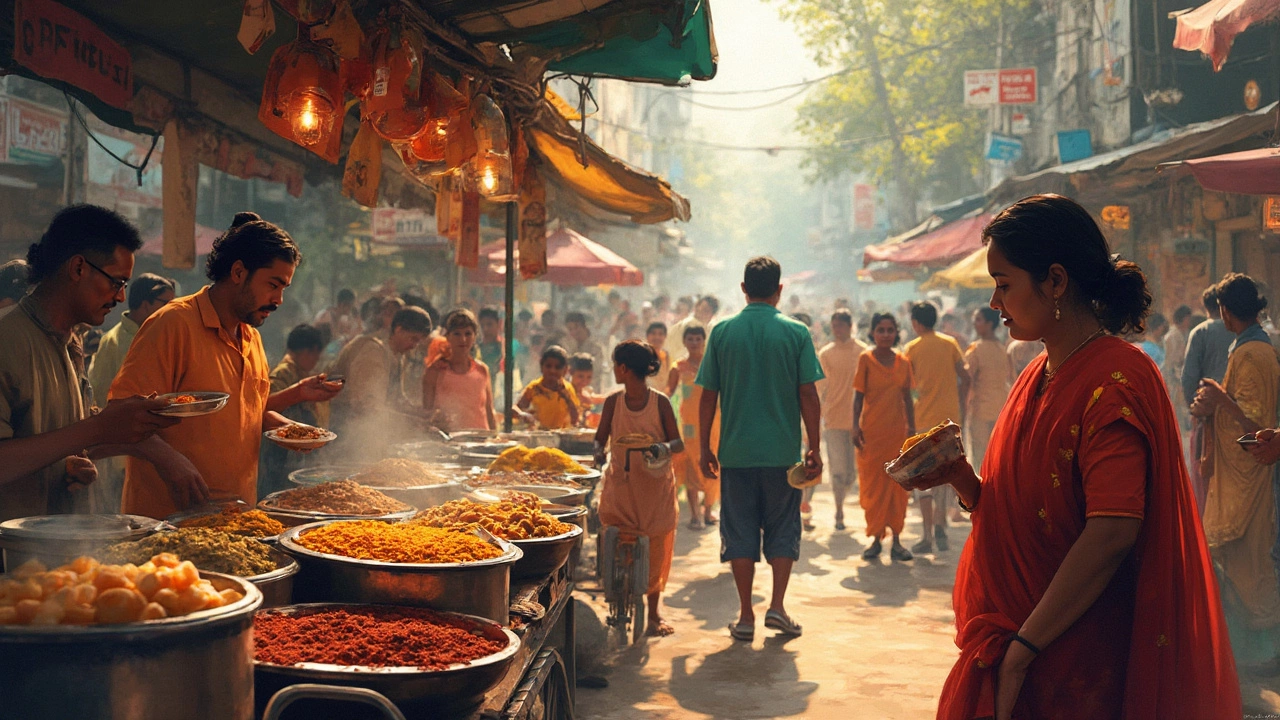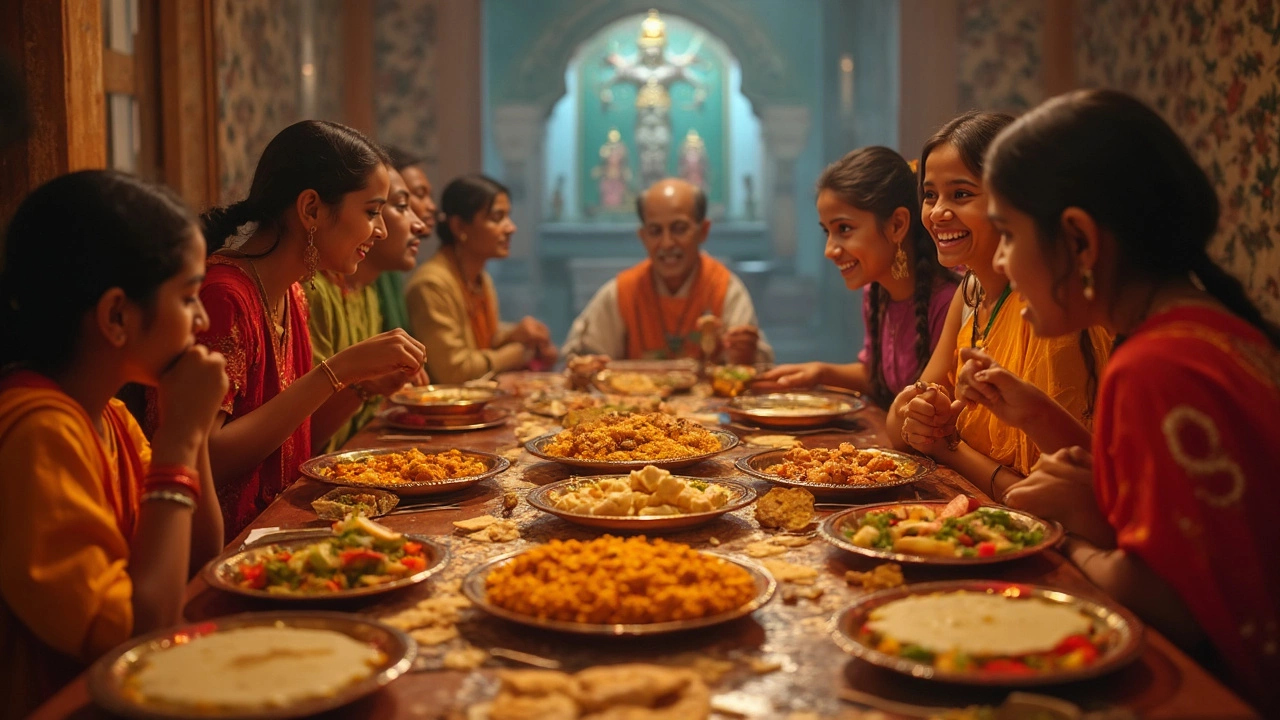If you've ever ordered "vegetarian" food in India and expected eggs in your dish, you'll walk away surprised. Eggs just don't make the cut for Indian vegetarians—no omelets, no egg curries, not even the eggless cakes leave any eggs hidden in the batter. But where does this line in the sand come from? The answer is way deeper than just a food label.
In India, the word "vegetarian" means something stricter than in a lot of other places. Veggies, fruits, lentils, grains, milk, cheese? All good. Eggs? Nope. Even though they aren't meat, eggs are usually grouped with non-veg food in most Indian homes. Some families won't even use egg-based shampoo. Sounds strict, but it's the norm for millions.
- Different Meanings of Vegetarianism in India
- The Cultural and Religious Roots Behind Avoiding Eggs
- Everyday Life: Eating Out and Cooking Without Eggs
- Egg-Free Cooking Hacks and Alternatives in Indian Cuisine
Different Meanings of Vegetarianism in India
When someone says they're a vegetarian in India, it means a lot more than just skipping steaks. For most Indians, being vegetarian is stricter than the Western version. In fact, if you ask for vegetarian food in India, you can expect it to be completely free of eggs every single time. The idea of adding eggs is just off the table in most traditional homes, restaurants, or even packaged food labeled as veg.
The root of this strict divide comes from centuries of religion and philosophy. In Hinduism, Jainism, and some Buddhist branches, vegetarianism isn’t just about health; it’s about not harming living beings. Since eggs have the potential to become life, they’re just as off-limits as chicken or fish for these faiths. But there’s another layer: in India, even between vegetarians, there are soft differences.
- The classic Indian vegetarian avoids meat, fish, and eggs. Milk and milk-based products like paneer and yogurt are usually fine.
- Jains take it a step further: they skip root vegetables like onions and garlic along with all the above.
- The small but growing group labeled as "eggetarians" eat eggs but no other meat or fish—mostly in urban areas or among younger people, but they’re still a minority.
Here's a quick look at what different groups mean by "vegetarian" in India:
| Type | Allowed | Not Allowed | Common Regions/Religions |
|---|---|---|---|
| Indian Vegetarian | Fruits, vegetables, dairy | Eggs, meat, fish | Hindus, Sikhs |
| Jain Vegetarian | Fruits, vegetables (except roots), dairy | Eggs, meat, fish, root vegetables | Jains |
| Eggetarian | Fruits, vegetables, dairy, eggs | Meat, fish | Urban youth, select communities |
You can spot the egg-free culture all around, from school lunches to street food. Most people who grew up in India never question it—it's just how things have always been. And even in places where families do eat eggs, they never call it vegetarian. It's this clarity that helps avoid confusion, especially when you're buying snacks or eating out. If a product is labeled "veg," you can trust it's free from both meat and eggs.
The Cultural and Religious Roots Behind Avoiding Eggs
When folks in India say they're vegetarian, it doesn't just mean skipping meat. There’s real meaning packed into this choice, and a lot of it comes from deep-rooted beliefs. For a massive chunk of Indian society, being vegetarian is tied directly to religion—especially Hinduism, Jainism, and certain Buddhist traditions. In these groups, the idea isn’t just about what’s healthy, but about non-violence and keeping the body and mind pure.
Eggs get complicated. The logic goes like this: an egg can turn into a living creature, even though most eggs you get from markets are unfertilized. Still, the idea sticks that eggs have the potential for life, so they’re grouped with meat. According to Hindu worldview, food is more than nutrition—it’s linked to karma and inner peace. Swami Sivananda, a well-respected Indian spiritual teacher, put it this way:
"A vegetarian diet is the best diet. Simpler food, such as milk, fruits and vegetables, brings calmness and serenity, whereas flesh food and eggs excite the passions."
Jains, one of India’s oldest communities, take things even further. They avoid all eggs, root vegetables, and anything that harms tiny creatures or life forms. For them, it’s about non-violence all the way, not just with big animals, but even with small or unseen ones. The same idea stretches into many Hindu homes, where food cooked with eggs won’t be allowed during religious festivals, or even inside the kitchen at all.
In most Indian towns and cities, it’s easy to spot the difference in restaurant menus—anything labeled as "pure veg" is a no-egg zone, and that's not up for debate. If you're looking to get a real sense of Indian vegetarians, just watch how clear this line is in daily life. Many moms will double-check store-bought sweets or bread just to make sure no egg made its way in, especially during special celebrations or fasting days.

Everyday Life: Eating Out and Cooking Without Eggs
For Indians who skip eggs, normal eating routines look a bit different than what folks in the West might expect. In most vegetarian Indian homes, eggs are just not part of daily life. If you open the typical vegetarian family fridge, you'll find fresh vegetables, lentils, milk, yogurt—but not a single carton of eggs. This habit spills over into India's restaurant culture, too. When a menu says "vegetarian," it's a sure thing there's no egg in the dish. In fact, restaurants often mark vegetarian items with a special green dot and non-veg with a red dot. A lot of travelers find it helpful to know this quick visual code.
Bakeries and sweet shops go out of their way to make eggless treats. Wedding cakes, pastries, cookies, or muffins—almost all have "eggless" versions, and you usually have to ask specifically if you want something with egg. This is great if you’re allergic or simply want to avoid eggs for any reason. Places like Mumbai, Delhi, and Bengaluru have entire bakeries devoted only to eggless goodies. Even international fast-food chains in India, like Domino’s and McDonald’s, offer special eggless buns and sauces for their vegetarian customers. Check out this quick comparison:
| Item | Western Veg Version | Indian Veg Version |
|---|---|---|
| Burger Bun | Often with egg | Eggless |
| Cake | Egg-based | Eggless |
| Mayonnaise | Egg-based | Eggless/vegan mayo |
| Pasta | May contain egg | 100% durum wheat, no egg |
If you’re cooking at home, recipes in Indian vegetarian cookbooks almost never call for eggs. Fluffy cakes, thick batters for fritters, even rich “eggless” mayonnaise—home cooks rely on tricks like using yogurt, condensed milk, vinegar with baking soda, or even mashed bananas. For coating and binding, a mix of chickpea flour and water does the job. You don’t feel like you’re missing out, even if you’ve swapped out eggs.
Eating out is actually pretty low-stress for Indian vegetarians. Restaurants make it plain which dishes are eggless, and staff are used to answering questions about ingredients. Don’t be shy about double-checking, though, especially at fusion places or when ordering baked goods. Generally, sticking to Indian veg food is the safest bet if you’re avoiding eggs—dishes like dal, dosa, sabzi, idli, paneer curries, and most Indian breads (roti, naan) are naturally egg-free.
- Look for the green dot symbol to confirm a dish is vegetarian (eggless).
- If unsure, just ask: "Is this eggless?" Staff are well-trained to answer.
- At bakeries, request to see the "eggless" menu or ask for eggless cakes.
- While cooking, sub eggs with yogurt, baking soda, or gram flour mix as needed.
Egg-Free Cooking Hacks and Alternatives in Indian Cuisine
Ever wondered how Indian home cooks whip up soft, fluffy cakes and rich gravies without eggs? It’s all about smart swaps and a bit of kitchen know-how. Since eggs are out for most Indian vegetarians, people have gotten pretty creative with substitutes that keep all the taste and texture, sans egg.
For baking, common tricks include:
- Curd (yogurt): A few spoonfuls of plain yogurt add moisture and help things bind. You'll see this in eggless cakes or muffins, especially in home kitchens.
- Condensed milk: Gives sweetness and a thick boost to the batter. Many Indian bakery-style cakes rely on this trick.
- Baking soda and vinegar: The fizz gives cakes that light, airy rise—no egg needed.
- Mashed banana or applesauce: Swapping eggs with mashed fruits works great, especially for breakfast bakes or desserts. Plus, kids love the taste.
What about savory cooking? Indian gravies and snacks don’t usually call for eggs anyway, but if a recipe does, besan (chickpea flour) steps in. Besan batter is what gives pakoras (fritters) their crunch, and it can even make a decent egg-free omelet (just search for “besan chilla”).
Looking for binding in cutlets or kebabs? Instead of eggs, home cooks reach for boiled potatoes, bread crumbs, or soaked poha (flattened rice). These do the job and keep flavors neutral, so your spices shine through.
And it isn’t just about ingredients. A lot of Indian recipes naturally don’t need eggs, so if you stick to classics like dal, sabzi, biryani, or dosa, you’re already in the clear. Many restaurants now list “eggless” on dessert menus to help folks pick safely.
Quick tip if you’re shopping or eating out: Always double-check labels and ask about “hidden eggs” in baked goods, dressings, or sauces. The egg-free culture in India means you’ll find tons of packaged snacks proudly stamped “100% vegetarian,” thanks to that familiar green dot symbol.
